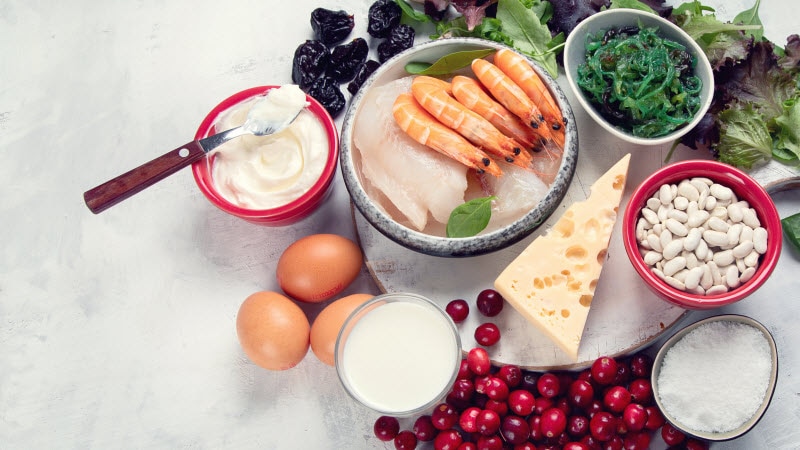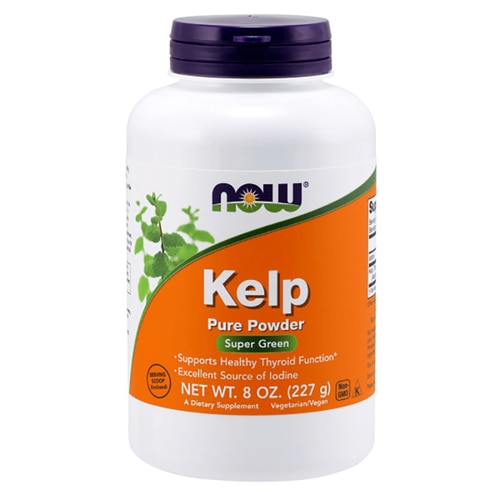[vc_row][vc_column][vc_column_text]Like all essential minerals, the consumption of
iodine is needed for the body to function properly. We can’t make it on our own, so being sure to include iodine rich foods in your diet is important for maintaining healthy levels.
Among its many roles in day-to-day body functions, iodine plays a major role in the production of thyroid hormones. Without enough of the mineral, you can experience a range of thyroid-related symptoms, from fatigue to mood changes.

What is iodine?
Iodine is an essential mineral that humans get from iodine foods and iodized salts. It’s found naturally in ocean waters and healthy soil, which is why maintaining healthy levels is easy when you eat a balanced diet.
While it’s critical to get enough iodine for
thyroid function and proper brain and bone development, consuming too much of the mineral can lead to problems. Eating excessive amounts of very high iodine foods, like dried
seaweed, or taking iodine supplements may cause excessive amounts to build up in the body, which can be problematic.
Most adults are getting enough iodine in their diets, but there are some risk factors for iodine deficiency, including soil nutrient depletion, poor diet and consumption of chemicals found in processed foods that deplete iodine levels. Women who are pregnant and breastfeeding also need to increase their iodine intake for their own health and the health of their babies.
What does iodine do for the body?
Perhaps its most well-known function, iodine is used by the body to create thyroxine (T4 hormone) and triiodothyronine (T3), two hormones that are produced by the thyroid and play a role in many important body processes. Healthy thyroid function relies heavily on proper iodine levels.
In addition to its influence on thyroid hormone production, iodine also plays a role in proper brain and bone development during pregnancy and infancy. A iodine deficiency can lead to issues with cognitive function among children, and impair both physical and mental development.
Some iodine benefits to consider
1. Supports thyroid health
Healthy iodine levels are critical for proper thyroid function. The thyroid needs enough of the essential mineral to make major hormones thyroxine and triiodothyronine, which regulate several daily biochemical reactions in the body. These
thyroid hormones allow for healthy digestive enzyme activity, amino acid synthesis and skeletal system development.
What happens if you don’t produce proper levels of thyroid hormones? You can experience symptoms such as fatigue, changes in weight, joint pain, brain fog and moodiness.
2. Supports child development
Iodine is needed for the early stages of human bone and brain development; it can also impact a baby’s birth weight. This is why it’s so important for pregnant women and infants to get enough iodine from their diets, for women, and breastmilk or formula for babies.
3. Promotes healthy brain function
Iodine plays a role in facilitating brain development and a deficiency in the mineral may cause neurodegenerative impairment.
Getting enough iodine for brain health is particularly important among infants and young children.
4. Helps protect against infections
Topicals containing iodine, commonly in liquid form, can be used to prevent infections by fighting bacteria around mild cuts, burns or wounds. It should not, however, be used for deep cuts.
5. Works as water disinfectant
Iodine can be used for disinfecting water; this is sometimes done to disinfect water when there are no clean sources available. Iodine tinctures or tablets can be used, but this method should only be relied on when needed and with special attention on disinfection techniques because it may lead to
excessive iodine consumption.
How to get iodine in your diet
Iodine is present in various foods, so it’s quite easy to maintain healthy levels of the mineral with a balanced diet. The ocean provides some of the world’s most
iodine-rich foods, including seaweeds like kelp,
wakame, kombu and nori. Iodine is also present in the Earth’s soil, but the levels vary, so not all produce will contain the same mineral levels.
Some of the best sources of iodine include:
- Wild-caught cod
- Tuna
- Dried kelp
- Dried wakame
- Dried nori
- Yogurt
- Grass-fed milk
- Cage-free eggs
- Grass-fed butter
- Cheeses (like cheddar and mozzarella)
- Legumes/beans
- Barley
- Leafy greens
- Dried prunes and raisins
- Bananas
Want to add more iodine foods into your diet? Eating seaweeds, wild-fish, organic dairy, whole-grains and organic vegetables will ensure that you’re getting enough of the nutrient.[/vc_column_text][/vc_column][/vc_row][vc_row][vc_column][vc_text_separator title="Featured Products" border_width="2"][vc_row_inner][vc_column_inner width="2/12"][/vc_column_inner][vc_column_inner width="3/12"][vc_single_image image="153675" img_size="full" onclick="custom_link" link="https://www.vitacost.com/ancient-nutrition-multi-womens-once-daily"][/vc_column_inner][vc_column_inner width="2/12"][/vc_column_inner][vc_column_inner width="3/12"][vc_single_image image="159951" img_size="full" onclick="custom_link" link="https://www.vitacost.com/ancient-nutrition-multi-womens-once-daily"][/vc_column_inner][vc_column_inner width="2/12"][/vc_column_inner][/vc_row_inner][/vc_column][/vc_row]




